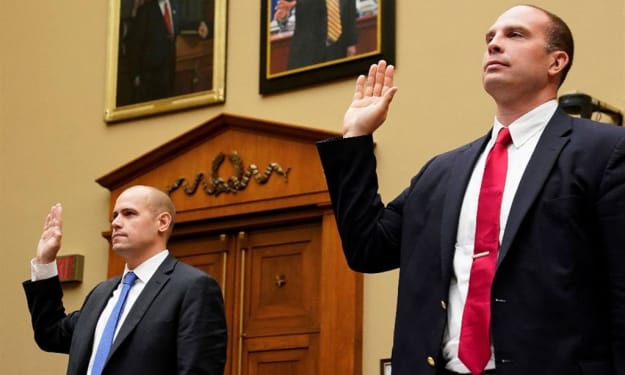congress
A handy guide to all Congress happenings on both sides of the aisle. Thank goodness for this political body that keeps Presidential power in check.


Two Birds, One Stone
Before I begin this article, I must emphasize a few things. One, this is not a defense, nor condemnation of the actions these sailors have taken. Two, I in no way have any knowledge of their cases beyond what is publicly available. Three, this article is not intended to be your sole source of information on this case. It is but a start for more critical thinking about these cases, and others like it.
Atomic HistorianPublished 9 months ago in The Swamp

NIGER COUP 2023
In one of the world's most unstable nations, Niger, an apparent coup attempt has been made by a group of soldiers, claiming to have removed President Mohamed Bazoum from power. This dramatic development unfolded in the capital, Niamey, where armed troops blockaded the presidential palace.


REVOLUTIONIZED WARFARE
The escalating military capabilities of the U.S. and its allies surrounding Taiwan have made a successful Chinese invasion and occupation of the self-ruled island a challenging endeavor. However, experts now warn that China might resort to a new tactic known as "cognitive warfare" as its People's Liberation Army (PLA) increasingly focuses on "intelligent warfare" enabled by artificial intelligence (AI) systems and concepts.
2023 UAP & UFO Congressional Oversight Hearing - What You Need to Know
Unpacking the recent Congressional hearing concerning Unidentified Anomalous Phenomena (UAP / formerly UFOs) is challenging. Our media has made a habit out of telling us what to think for the past twenty or so years, thus many of us are out-of-practice at listening and critical thinking when we are presented with so much raw information.


Aliens really exist? Do they come in peace or have they already arrived?
David Grush, Ryan Graves, and David Fravor are at the centre of a new controversy regarding UFOs, or UAPs to be precise. Under oath, the three veterans stated, in front of the Congress, that not only does the USA government know a lot about extraterrestrial technologies, but it is also in possession of entire spaceships and non-human biological entities. The three veterans demanded from the government more transparency and better communication about this situation with American citizens, yet none of the vaguely mentioned reports have been made public (even though the hearing was made public precisely with the aim of being more transparent).
Vik's opinionPublished 9 months ago in The Swamp

President Wants to Downsize Military, Legalize Drugs and Prostitution
February 27th (Portland, OR) – During a rare first-year State of the Union address, the President of the United States proposed a number of new, expanded, and reallocated programs. This included creating considerable controls over medical billing; investing in research that may lead to lowering the death rate related to heart disease; building massive desalination plants and filling the deserts with water; deploying more renewable and nuclear energy capabilities (along with carbon sequestration); constructing an elevator to space; and starting a two-year required national service for 18-year-olds. Of course, all of those high ideals brought up one question...


Biden Administration's Attempt To Fill America With Submissive, Christian, Black Immigrants Who Despise Black Americans
Sunday, 30 July 2023 By: TB Obwoge "Blacks are thugs!" "There are more of you in jail then in university!" "Akata!" (filthy animal, cotton picker, person who forgot their language)
IwriteMywrongsPublished 9 months ago in The Swamp

'Divide and Conquer' Isn't Just a Phrase...
Does the phrase 'Divide and conquer' mean anything to you? Does it at least sound familiar? I thought as much. When you think about it, what comes to mind? A strategy used by monarchs and presidents alike in the past, but do you still see its effects in modern society. You might not notice it, or might not think of it too much, but we are divided in so many ways, that I can hardly count them. We fight like cats and dogs now more than ever, but why? Why is it so hard for us to get along, make a compromise and meet in the middle. It can be easy, if the right person is in power, but that's not the case in America's society. I have yet to see someone who perfectly listens to both sides of an argument and THEN makes a statement/law. I usually see people who lean more on one side than the other, and that shouldn't be the case at all. Maybe it's just me, but a leader should NOT be biased.


They're Here
Whether you believe as most do, that there is other life in the universe, or you aren't a believer in extraterrestrial life, nothing changes what happened this week. Not just one, but three former military officials testified in Congress on Wednesday, July 26, that the government knows more about Unidentified Aerial Phenomena than they were telling us.
Jason Ray MortonPublished 9 months ago in The SwampFive Startling Disclosures from the UFO Congress: Murder, Government Cover-Up, and 'Non-Human' Biology
In a groundbreaking event, a first-of-its-kind hearing was held in the US Congress, where expert witnesses came forward to share their extraordinary encounters with unidentified flying objects (UFOs). The testimonies provided during the UFO Congress revealed jaw-dropping revelations, ranging from "non-human" craft sightings to allegations of a long-standing government cover-up, involving threats of violence to whistleblowers. Let's delve into the five most startling disclosures that emerged from this unprecedented gathering of UFO experts.
Zeeshan MayPublished 9 months ago in The Swamp

White House Denounces 'Dangerous and Extreme' Holocaust Comments on Fox News
The White House expressed strong condemnation towards Fox News on Tuesday, in response to remarks made by one of its top hosts regarding the Holocaust. The comments were labeled as a "terrible, dangerous, and extreme lie" that deeply "disrespects the memory of the millions who suffered under Adolf Hitler's Nazi regime."
Zeeshan MayPublished 9 months ago in The SwampImpact of Wealth on Happiness and Well-being
In our society, wealth is often associated with success and happiness. However, the relationship between wealth and well-being is more complex than it seems. While financial security is undeniably important, the impact of wealth on happiness extends beyond monetary factors. In this article, we will delve into the various dimensions of wealth and explore how it influences our overall well-being, highlighting the importance of finding a balance between financial success and personal fulfillment.





















